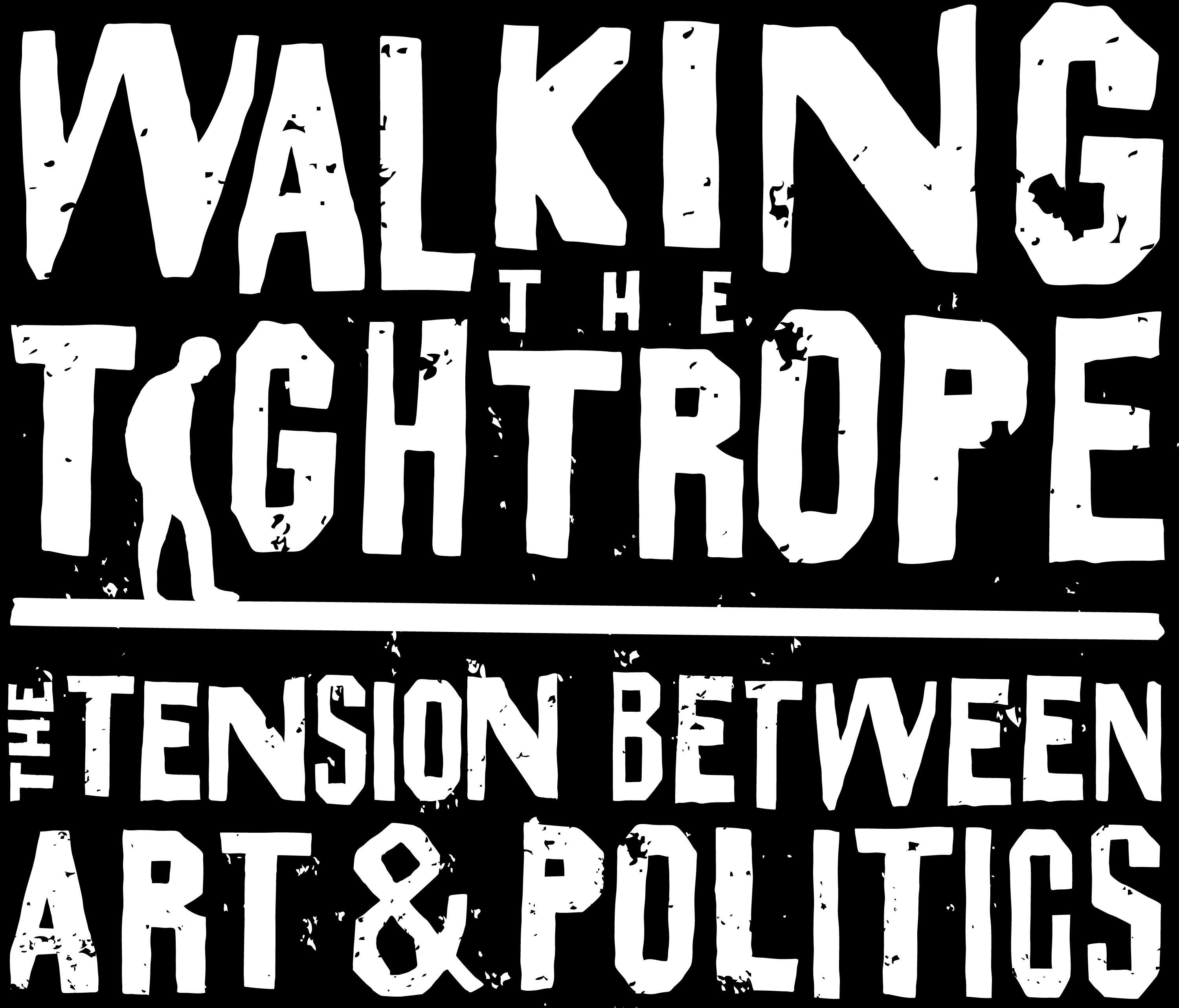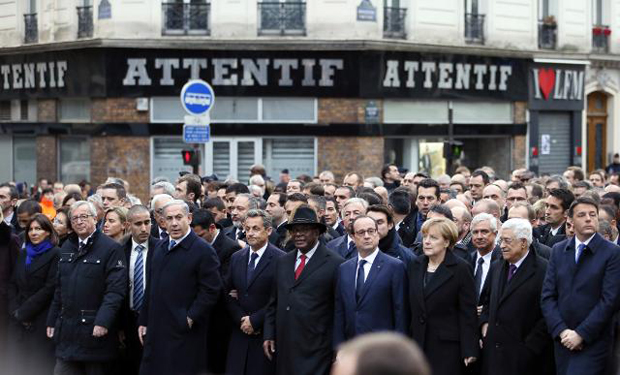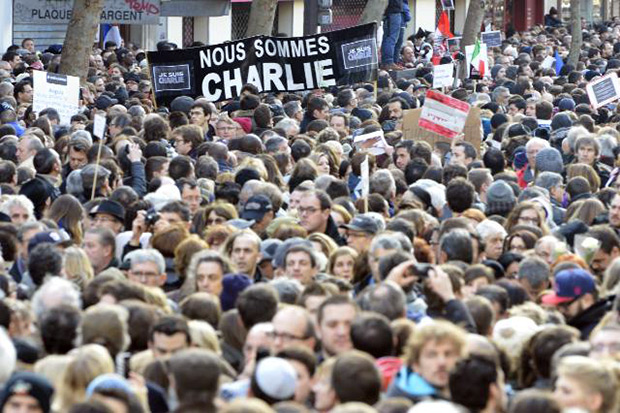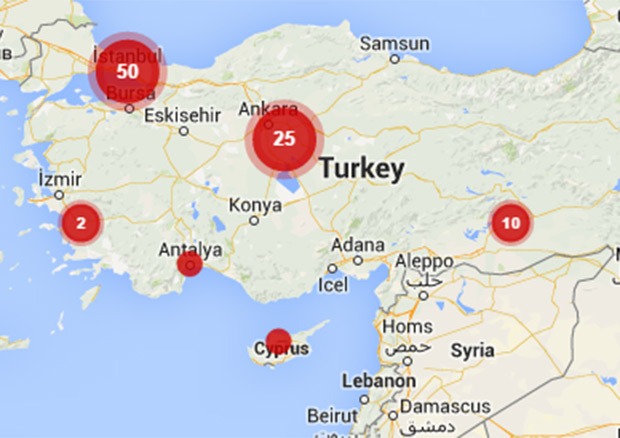21 Jan 2015 | News and features, United Kingdom

Cressida Brown is the artistic director of Offstage Theatre. The views presented in this guest post are the author’s own.
I have been asked to write about why I decided to initiate Walking the Tightrope, and explain why I think a project exploring how politics and art interact is important and urgent now.
The answers to both those questions lie in the very experience I have had in putting on this festival of strongly opinionated plays which touch on art censorship, cultural boycott, offensive art, and accusations of racism. Throughout I have genuinely felt as if I am walking a tightrope. And now, in the wake of the Charlie Hebdo attacks, this feels more so than ever.
Nerve racking questions have stayed unanswered; Should I censor a play about art censorship if it is offensive? Might it offend people? How can I make sure we get a balanced sense of opinions? Is it possible to be neutral hosting these explosive plays? How can I get a debate going but avoid a backlash? How do I make sure I don’t get anyone in trouble, including myself?
The fact freedom of expression seems so complicated to negotiate at the moment is exactly why I think we should raise it.
Last summer I did not feel so cautious when I posted the question “How can this be seen as anti-Semitic?” on to my Facebook timeline. I was referring about the Tricycle Theatre offering to replace Israeli funding of the Jewish Film Festival. I assumed that everyone I was friends with, especially those who were in the arts, would agree with me.
A couple of hours later my page had exploded in over 60 warring comments about the Tricycle but also about the Underbelly decision to cancel an Israeli government funded show.
And then I did something that triggered my eventual decision to initiate this festival. I deleted the entire 60 strong thread from my wall. I had worried how my opinions might be regarded by others. Or whether my politics were going to affect my relationships in the art community. I had self-censored.
Hot on the heels of the Tricycle came the Exhibit B affair. It suddenly started to seem very unwise to post a political view online about what an art venue should or shouldn’t do.
Why was I so worried about others seeing my opinions? Shouldn’t this be what art is about, passionately asserting an opinion? Why had I never found out what my peers opinions were on these topics before? How had I never realised what a thorny and perhaps paradoxical thing Freedom of Expression can be? Why was it that it took 3 controversies hot on the heels of one another for me to begin to ask these questions to myself? Why should it only be in the heat of the moment that I debate these issues with my peers? Why did that debate initiate online and not in person?
I am well aware how explosive this subject can be, and also that it may explode in a very bad way directly back onto me. However I have dedicated my life to this industry, I need to unpack what happened. I can’t have this debate by myself. Now, with some distance from the events of last year, I have decided to do this the only way I know how: theatre.
During this event’s shared experience, the audience responses are just as important as the artists’ vigorous plays. The post show discussions are geared towards replacing a fury of warring tweets with facilitated conversation on Freedom of Expression. The plays are meant to offer a springboard for the post show discussions to leap from. By the end of these festivals I want all of the audience to have listened and experienced greater understanding of their opponents, and considered positions they had never perhaps done before.
Several months have passed since those particular triggering events. I had wondered at times whether the conversation would still be relevant at the beginning of 2015, which seems now like a ridiculous concern. As I write the Charlie Hebdo attack has created solidarity across the world in the defense of free expression and society is left with a mine field of explosive commentary and grief. In other recent news American director Ari Roth has been fired for ‘insubordination’, BP have been told to reveal their funding of the Tate, and Sajid Javid announced his opposition to cultural boycott.
Who knows how these other controversies will have unfolded by the time we are actually performing these plays in front of you…
My hope however is, is that we will continue to meet these controversies with a renaissance in political theatre, discussing liberty through live, tangible art and conversation.
This guest posted was published on 21 January 2015 at indexoncensorship.org
16 Jan 2015 | Europe and Central Asia, Guest Post, News and features

World leaders march in Paris following the recent attacks in France (Photo: European Council)
Jacob Mchangama is the founder and executive director of Justitia, a Copenhagen-based think tank focusing on human rights and the rule of law. He has written and commented on human rights in international media including Foreign Policy, Foreign Affairs, The Economist, BBC World, Wall Street Journal Europe, MSNBC, and The Times. He has written and narrated the short documentary film “Collision! Free Speech and Religion”. He tweets @jmchangama
The brutal attack against Charlie Hebdo has seen European leaders rally round the fundamental value of freedom of expression.
French President Francois Hollande led the way by stating: “Today it is the Republic as a whole that has been attacked. The Republic equals freedom of expression.” Prime Minister David Cameron vowed that Britain will “never give up” the values of freedom of speech, and German Chancellor Angela Merkel called the events in Paris “an attack on freedom of expression and the press — a key component of our free democratic culture.” European Union President Donald Tusk stressed that “the European Union stands side by side with France after this terrible act. It is a brutal attack against our fundamental values, against freedom of expression which is a pillar of our democracy.”
This unified commitment to freedom of expression is both admirable and crucial in the aftermath of the killing of cartoonists armed with nothing more than ink, humour and courage. It is also true that freedom of expression is a fundamental European value and that (Western) Europe allows for a much freer debate than most other places in the world. However, European governments and institutions have long compromised this freedom through statements and laws that narrow the limits on permissible speech. Ironically some of these statements and laws target the very kind of offence that Charlie Hebdo excelled in.
Donald Tusk’s principled defence of freedom of expression stands in stark contrast to a 2012 joint statement issued by then EU High Representative for Foreign Affairs Catherine Ashton, as well as the Organisation of Islamic Cooperation and the Arab League that “condemn[ed] any advocacy of religious hatred … While fully recognising freedom of expression, we believe in the importance of respecting all prophets”. The statement followed the furore over the crude anti-Islamic film “The Innocence of Muslims”, and suggests that mocking prophets is tantamount to religious hatred prohibited under international human rights law and thus exempted from the protection of freedom of expression.
The controversy over The Innocence of Muslims prompted none other than Charlie Hebdo to print its own depictions of Mohammed, including one showing Islam’s prophet naked. That decision drew stern condemnations from the French government. Then Foreign Minister Laurent Fabius remarked that “in the present context, given this absurd video that has been aired, strong emotions have been awakened in many Muslim countries. Is it really sensible or intelligent to pour oil on the fire?”
While Charlie Hebdo has won a number of lawsuits other French figures have been convicted or censored under French law. Last year comedian Dieudonné M’bala M’bala was banned from performing his comedy shows publicly, due to their anti-semitic content. And France is not alone. Swedish shock artist Dan Park was sentenced to six months imprisonment in 2014, over a number of purportedly racist posters deemed “gratuitously offensive” to minority groups by a Swedish court. The owner of the gallery that had displayed the cartoons was also convicted and the posters ordered destroyed.
In 2011, a prominent Austrian Islam-critic was convicted of “denigration of religious beliefs” for stating that the prophet Mohammed “had a thing for little girls”. An elderly Austrian man was found guilty of the same offence for yodelling while his Muslim neighbour was praying. In the United Kingdom, an atheist who left caricatures of the Pope, Mohammed and Jesus in a prayer room in John Lennon Airport was similarly convicted and sentenced to six months imprisonment, though the sentence was suspended. A TV personality’s disparaging social media comments about Scotland and Scots recently prompted Scottish police to tweet that it would “thoroughly investigate any reports of offensive or criminal behaviour online and anyone found to be responsible will be robustly dealt with”.
France and numerous other European countries also have bans against Holocaust denial. In 2010, a Muslim group claiming to expose free speech double standards in the aftermath of the Danish cartoon controversy was convicted after publishing a cartoon suggesting that Jews have made up the Holocaust.
When it comes to countering terrorism, European states increasingly target not only expression that incites terrorism but also expression that may constitute “glorification”. Exactly a week after the attack against Charlie Hebdo, Dieudonné once again ran afoul of the law and was detained over a Facebook post. According to Le Monde at least 50 other cases of terror apology have been opened against people in France since the attack. In Denmark, a number of Islamists have been prosecuted for glorifying terrorism following Facebook postings that seemingly approved of terrorism, including the assault on Charlie Hebdo. Recently British Home Secretary Theresa May unveiled plans that would ban “non-violent extremists” from using television and social media to spread their ideology.
While Europe has a sophisticated and elaborate regional system for the protection of human rights, these institutions have frequently sided with the censors over citizens. In 2008 the EU adopted a framework decision obliging all member states to criminalise certain forms of hate speech. The European Court of Human Rights has found the confiscation of a “blasphemous” film, the conviction of a French cartoonist mocking the victims of 9/11, and the banning of religious fundamentalist group Hizb-ut-Tahrir compatible with freedom of expression. The Council of Europe’s current High Commissioner for Human Rights Nils Muižnieks, has called for all 47 member states to enact bans against Holocaust denial and gender based hate speech.
These non-exhaustive examples demonstrate that contemporary Europe’s approach to freedom of expression is far more complicated and far less principled than the statements made by its leading politicians in recent days suggest. It is an approach to freedom of expression based on the premise that social peace in increasingly multicultural societies requires restrictions on freedom of expression in order to avoid offending ethnic and religious groups. Thus in 2004, when Dutch film maker Theo Van Gogh was murdered by an Islamist offended by Van Gogh’s controversial and anti-Islamic film “Submission”, the Dutch minister of justice proposed to revive the country’s blasphemy law which had been disused since 1968. He argued that “if opinions have a potentially damaging effect on society, the government must act … It is not about religion specifically, but any harmful comments in general.”
Such sentiments might appeal to pragmatists in the wake of the tragedy in France. But there is little reason to think that restricting freedom of expression fosters tolerance and social cohesion across a Europe increasingly divided along ethnic and religious lines, and where anti-semitism and other forms of intolerance is on the rise. In fact such laws seem to fuel the feeling of separateness of modern Europe by legally protecting group identities against offence rather than fostering an identity rooted in common citizenship. While minorities may be offended by disparaging comments, insisting that freedom of expression be limited to protect them from racism and offence, is a very dangerous game at a time where far-right movements with questionable commitment to liberal democracy are on the rise. In this context it should not be forgotten that Dutch politician Geert Wilders once proposed banning the Quran and that the leader of Front National Marine Le Pen wants to ban religious head wear, including the Jewish kippah. The freedoms that (sometimes) allow bigots to bait minorities are also the very freedoms that allow Muslims and Jews to practice their faiths freely. By further eroding these freedoms, no one is more than a political majority away from being the target rather than the beneficiary of laws against hatred and offence. Only by reaffirming a genuine and principled defence of freedom of thought, expression and religion can Europe hope to create a society built on real tolerance and respect for diversity, and where cartoonists neither have to fear gunmen nor jail, but only the moral judgment of their fellow citizens.
This guest post was published on 16 January 2015 at indexoncensorship.org
15 Jan 2015 | Europe and Central Asia, France, News and features

People marched in Paris to show their unity. Photo: European Council President / Flickr
There can be few more insulting coinages than the tedious phrase “moderate Muslim”. What does it mean? Who does it benefit? In the past week, since the atrocities in Paris, we have heard it often: “moderate” Muslims must condemn terrorism. Or, alternatively, the images of Mohammed printed by Charlie Hebdo (and others in solidarity) were alienating “moderate Muslims”: “free speech fundamentalists” must reach accommodation with “moderate Muslims”.
The suggested dichotomy — that one cannot believe in free speech and in Allah, is a dangerous one. More dangerous still is the underlying implication that the “moderate Muslim” is less of a believer than the Muslims who murder, supposedly in the name of God.
It is now eight days since a murderous gang set about killing cartoonists because they had blasphemed and Jews because they were Jews. The gang was composed of men who were Muslims (it is disingenuous, as British Culture Secretary Sajid Javid pointed out, to suggest that these people were not really motivated by Islam, unless you are willing to put yourself forward as the ultimate authority on what is and isn’t Islamic).
Since then, we have gone from revulsion at the acts of the killers to an obsessive focus on the actions of their victims (or at least their victims at Charlie Hebdo: there is relatively little discussion of the slain shoppers in the kosher supermarket).
The function of all this, unwittingly perhaps, is to reinforce a power dynamic. This is about “us” and what “we” did to “them”. “Us”, roughly, being liberal democracy: “them” being European Muslims who somehow, “we” have decided, are something outside.
Worse, we have decided that there is a continuum of “Muslim anger”, at the end of which is inevitable violence. This is to imagine a homogenous bloc of believers, and to ignore the sectarian and political struggles that exist within Islam. By ignoring these struggles, we in fact junk normal Muslims (enough of the “moderate”) in with those for whom the faith is a political project and even an imperial war with the intention of “restoring the Caliphate”.
Meanwhile, “we” have the comfort of decrying our own hypocrisy.
Crying “hypocrite” is enjoyable; indeed, it’s an essential part of how the British press, and British political and social advocacy, works. Beloved satirical institutions thrive on pointing out double standards.
But tempting though this tack is, it is not an argument in itself: yes, the French state is hypocritical on free speech, lauding Charlie while arresting racist comedian Dieudonné for a Facebook post, and announcing a “crackdown” on hate speech. Of course it is rich for world leaders to march for “free speech” when practically every single government you can think of has mechanisms for censoring its citizens in one way or another. But then what? Does that somehow mitigate the horror? Does that mean we shouldn’t stand for free speech? Does that mean, even, that censorship is OK because everyone does a little bit of it?
What is achieved by this is a focus back on our own ability to control things that seem beyond us. These attacks will stop, we imagine, when we find a way to avert them. The murderous ideology motivating these attacks was created by “us”, through, say, “our” support for the 80s jihad against the Soviet occupation in Afghanistan (as Christopher Hitchens pointed out in his 2001 article Against Rationalisation, it was the CIA that “first connected the unstoppable Stinger missile to the infallible Koran”).
But the fact our governments did some things in the past that have come back to haunt us is, again, not a reason for inactivity or passivity on our own parts now. Rather we must deal with what is in front of us, while hoping not to make mistakes that will come back to us.
It is a good and honourable thing that so many people’s instinct, when confronted with aggression, is conciliation. But loathe though my conciliatory soul is to admit it, there is nothing I can concede that will appease the ideology that led to the carnage in France. To quote Hitchens once more, what the murderers and their co-thinkers hate are the parts of liberal democracy that are worth defending: “its emancipated women, its scientific inquiry, its separation of religion from the state.”
None of these things are perfectly achieved in any society, but they should be clung to as aspirations, and defended when needs be. Moreover, they must be maintained as universal, emancipatory values. To portion them off, or worse, to present them as a weapon of one part of society against another — “free speech fundamentalists” versus “moderate Muslims”, is to give succour to those whose only perception of a universal ideal is universal subjugation.
This article was posted on 14 January 2015 at indexoncensorship.org
15 Jan 2015 | News and features, Turkey
Richard Howitt MEP is foreign affairs spokesperson for both the Labour Party and the Socialist and Democrat Group in the European Parliament and is a member of its joint parliamentary committee with the Turkish Parliament
As millions mourn the shooting of journalists in France, the European Parliament convening this week in Strasbourg today extended the fight for freedom of expression to legal threats, harassment and character assassination against free journalism in Turkey.
Indeed last weekend’s scenes reminded me of the hundreds of thousands who went on to the streets after the Turkish writer Hrant Dink was shot in 2007 and my deep regret that, despite the work of a foundation established by his widow, the situation in Turkey appears to have got worse not better in the intervening years.
A resolution voted for by MEPs was provoked by dawn police raids on newspapers and television stations in December that led to the arrest of 31 people, mainly journalists, on charges of terrorism – which carry some of the gravest sentences under the Turkish penal code.
Two of the leading journalists arrested openly admit sympathies for the US-based cleric Fethullah Gulen ,whose followers withdrew support from the country’s governing AKP party and whose so-called ‘movement’ does indeed deserve greater scrutiny.
Nevertheless reports suggest no evidence was presented of actual criminal intent against those arrested, with the crackdown fitting a pattern of legal harassment, smears and threats against those who provide political opposition to the government or who critically report on corruption allegations against it.
Our resolution also condemns the recent arrest of a Dutch journalist, demonstrating how foreign journalists are not exempt from attack.
Correspondents of The Economist, Der Spiegel and the New York Times in Turkey have all been threatened, with one CNN correspondent forced to flee the country after being accused of espionage.
Previous attempts to ban social media are also being revived in the country this week, in an apparent attempt to suppress reports Turkey’s intelligence organisation may have been implicated in the supply of arms to ISIS fighters in Syria.
As someone who is proud to call himself a friend of Turkey, and a keen proponent for the country’s accession to the EU, it is with a heavy heart I sign up to such criticisms.
However in negotiations I had to argue against opponents of the country seeking to use this latest incident to introduce wording that would have imposed immediate financial penalties against Turkey or put up new barriers in the membership negotiations.
I did so because politicians as well as journalists must not allow ourselves to be trapped in to self-censorship. On these arrests, it was our duty to speak out.
I am saddened explanations that the release of all but four of the journalists given to me and to my fellow MEPs by the Turkish representative in Strasbourg this week seemed wantonly to ignore the climate of fear and self-censorship which remains inflicted on the country’s press as a result.
It is the blatant denials that undermine trust and confidence with those of us who want to support reform efforts in the country, and which one very senior EU official told me had led to “desperation” in the telephone calls between Brussels and Ankara which followed the arrests.
Meanwhile, former prime minister Recep Tayyip Erdoğan, now elected as the country’s president, reacted characteristically by telling a news conference: “Nowhere in Europe or in other countries is there a media that is as free as the press in Turkey.”
The sober truth is that Turkey ranks 154 out of 180 in press freedom according to the Reporters Without Borders index last year.
The annual survey by the Committee to Protect Journalists, published only last month, showed Turkey amongst the top ten countries in the world for imprisoning journalists, ranking alongside Azerbaijan, Iran and China.
However, Erdogan’s protestations must be put in to a context where he also rebuffed European criticisms of the arrests saying the EU should “mind its own business”, and last week when he was prepared to partly attribute the Charlie Hebdo terrorist attack to “Western hypocrisy”.
Today’s European Parliament vote ascribes that hypocrisy instead to the government in Ankara.
I wonder whether the Turkish press will fairly report even this?
This article was posted on 15 January 2015 at indexoncensorship.org




